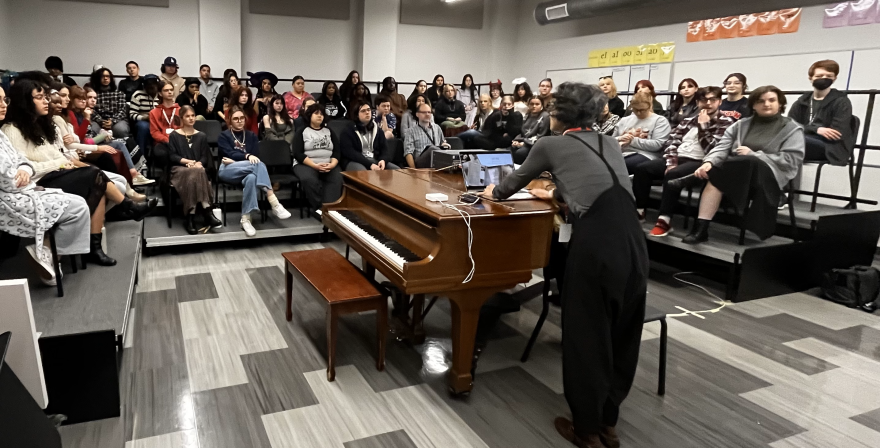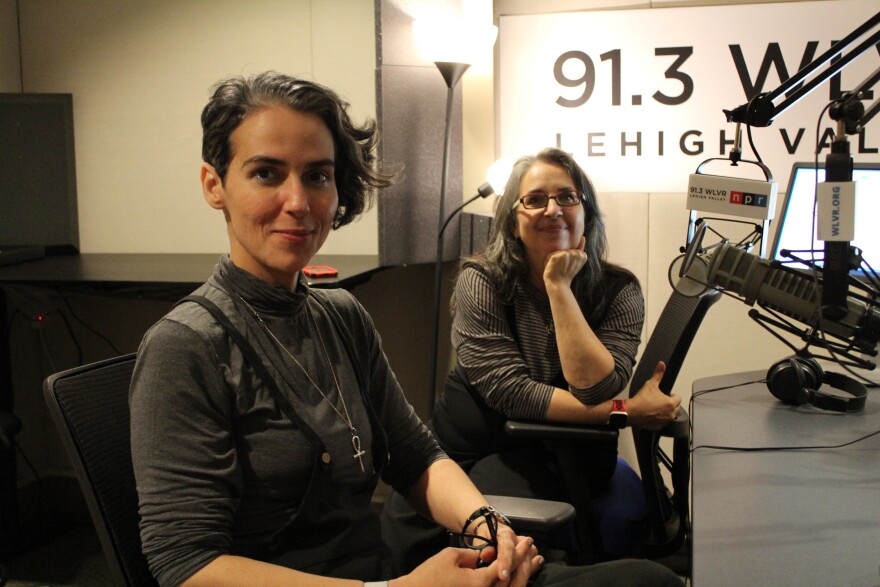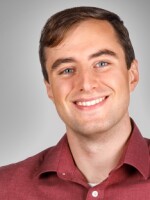- Clarice Assad, a Grammy-nominated composer, vocalist and pianist, has joined the Allentown Symphony as Miller Symphony Hall's 2023-24 composer-in-residence
- To begin her term in the position, Assad met with local music educators and students and is preparing for a new chamber music concert at 7 p.m. today, Tuesday, Oct. 24, in Easton Area High School. Admission is $10; free for students
- Assad, a Brazilian-American composer whose work spans and fuses genres, said she wants to inspire young composers to think outside the box
ALLENTOWN, Pa. — The Allentown Symphony and Miller Symphony Hall on Tuesday welcomed a Grammy Award-nominee as its composer-in-residence.
Clarice Assad met Tuesday with local young musicians before an Easton concert celebrating new compositions.
Assad, a Brazilian-American composer whose work spans and fuses various genres of classical, Latin, pop and jazz, said she wants to "inspire young composers to write, to create and to think outside the box when it comes to making music these days."
Over the next two years, Assad plans to lead workshops, connect with local students, educators and artists, and work with the symphony to introduce new ideas.
The symphony's former and first composer-in-residence, Chris Rogerson, joined in 2021, and during his two-year stint curated concerts, led workshops and worked with many local and regional musicians.
During her first two days as the 2023-24 composer in residence, Assad visited high schools and colleges in the area and will lead an iteration of the symphony's new chamber music concert series of her own curation that will highlight regional composers.
The concert will take place at 7 p.m. today in the Easton Area High School auditorium and will feature music by faculty from Muhlenberg College and Easton Area High School and other local composers.
Admission is $10; free for students.
Assad has more than 70 published composition works to her credit, including commissions for Carnegie Hall, the Chamber Music Society of Lincoln Center, the Boston Youth Orchestra, the Chicago Sinfonietta and the San Jose Chamber Orchestra.
Symphonies in São Paulo, Brazil; Tokyo; and Philadelphia have performed her compositions.
She is also a celebrated pianist and vocalist.
Assad's father — Brazilian guitarist and composer, Sergio Assad — was a judge at Allentown's Schadt String Competition for classical guitar in 2012, according to those at Miller Symphony Hall.
Clarice Assad will take that same place and be a judge for the upcoming 25th iteration of the competition, this time for cello.
Assad joined Silagh White, Miller Symphony Hall at the Univest Public Media Center in advance of tonight's concert. You can read the full interview below. It's been edited for clarity.
LEHIGHVALLEYNEWS.COM: So Clarice, tell me about what you're looking to do during your time here in the Allentown area, and how long your stay as a composer in residence is going to be.
CLARICE ASSAD: "This composition residency, it's going to last two years, and what I'm looking to do here is really to inspire young composers to write to create, and to think outside the box when it comes to making music these days."
You just went on a little tour of local high schools and colleges talking to some young artists. Tell me about that experience, and what kind of your first impressions of the Lehigh Valley art scene have been so far.
CLARICE ASSAD: "I see a lot of really talented young kids who want to create different music, create things that haven't been done before in a way to move classical music forward, you know, by blending elements of contemporary music that are happening right now.
"So I see a lot of hope for this industry of music that is mainly played in the concert halls."
SILAGH WHITE: "Yeah, I think what I've seen in the engagement is Clarice is very approachable, so high school students and college students are really receptive to her comments.
"What I mean by that is sometimes asking, 'Why did you do it this way?' or 'Have you thought about doing it that way?' when she's looking at a piece of a composition, and it doesn't feel like the students are receiving these comments as critically negative.
"It's, 'I never thought of it like that before, hmm, I want to play with that now.' And so when one is digging into their own personal vulnerability to create something like this, it's wonderful to have a professional composer who is established to come in and say, 'I've been where you are, I can tell you that this can happen, or this could happen. So I'm telling you take risks, do it, try it. See what happens. This is your sandbox, go.'
"The students, you can just see the fire just start to light. And that's what's wonderful about this program and being able to have so many young composers and so many young musicians work with Clarice."
What schools did you go to so far on this little introductory tour?
SILAGH WHITE: "This is just the first two days. So we've been to Parkland High School; we went to Swain [School in Allentown] which was a really interesting learning moment about how we can engage with Clarice and find out which age levels and grade levels really work.
"We're just trying to figure out how we can adapt opportunities of creation there, and that was yesterday.
"During the dress rehearsal, Clarice was also working with the composers with feedback as the musicians were running through their pieces for the concert on Tuesday evening.
"Today, we started off very early at Lehigh Valley Charter Arts High School, and just came back from having a couple of score reviews with some composition students at Moravian University."
So I'm curious, what kind of feedback have you been giving and what was it like talking to the students? What kind of topics came up?
CLARICE ASSAD: "Even though we're talking about music here, at the core of it, we have creativity as the main idea.
"So we're looking at music and musical notes and recreating sounds, but I'm encouraging people to be super creative, and they can take that advice, and put it in somewhere else in their lives.
"I'm just saying this because not all the people are going to become composers or become artists, per se. But if they have the ability to think creatively, and think if there are 10 other options, you can use this, they can take this idea into businesses that they might build in the future. So that's what I'm trying to do through music, if that makes sense.
"So I would say look at well, why can't you look at this passage of music that you created and invert it — and then they see it completely differently that they weren't able to see that before?
"If they took that idea if they were painting, I would say, can you use a different palette of colors? So that's stuff that when you're inside of your head, you cannot see.
"But if you have a pair of eyes, that's behind you, they can see the bigger picture from somebody older, who's been there and done it, which is my case, then it's a whole other thing. And it really helps shape and helps the creativity flow better."
When I was listening to some of your music, I think what came to my mind was 'Oh, this is presented to me as a classical music composer.' And the genres you work with and implement into your work go so far beyond what most people in the Lehigh Valley might think of as, you know, classical music. And it sounds like you're trying to kind of push this sort of boundary in terms of the sounds you can work with, with a lot of these students and everything.
CLARICE ASSAS: "Yeah, I think it's what's happening now is that classical music is a term that is a little bit outdated because it's from a ... period in time, right? In the classical period.
"I would say we're writing contemporary music or contemporary classical music, and everyone is trying to do something different. Nobody wants to sound the same. Nobody wants to do the same thing anymore. Not these kids, definitely not.
"I just taught this kid who's a classical guitarist who plays guitar in a rock band. So, you know, the merging of styles and fusion that they want to create is very much up in the air. And I think it's going to help propel this music forward. Because otherwise, we're just going to stay behind."
Your work has highlighted your connections to Latin America and connects to all these other genres and everything. You've worked with a lot of different symphonies. So, I guess, what are you doing here? What are you hoping to get out of this experience with the Allentown Symphony and with the community here?
CLARICE ASSAD: "That's a great question. I've been doing residencies with orchestras and organizations that promote, of course, the gifted composer, the opportunity to write something for them. And they perform it, which is great.
"But my favorite part is always the engagement with [the] community. So when I was approached by the symphony to be a part of this, my immediate response was like, yes, because here's an opportunity to get to know these young people over there, who I don't know, who don't know me, who can create something new, who maybe can start more readings, more opportunities for more people to be aware of this kind of music, what's happening and how it's evolving because it doesn't get a lot of mainstream play. Definitely not, right? But I think it should, and it could happen."
And so you're at the very start of this time here in the Lehigh Valley, what are you hoping to contribute to the area here? Any specific plans, events or ways of engagement that you're starting to see over the next two years?
CLARICE ASSAD: "I think so. I think what happened today in one of the schools was very interesting because I did a presentation on all of my work and at the very end, I was teaching a method of how to incorporate rhythmic ideas into shapes that anybody can read.
"So that opens accessibility to a lot of people who don't read music, to be able to create music together, and they were very intrigued by it.

"So I'm sure that some elements of this they can take into their own music. And the other thing is the merging of technology and AI and all of these new forms of gadgets that are coming — the new instruments that are coming into the world, how to implement that with the symphony, with the acoustic chamber music that we're making.
"I think that is definitely the future of it. And when I was talking about it, I saw a lot of eyes going like, 'Whoa, you want to do that? What are you doing? What is the technology that you're wearing?' Because I had a ring that can modulate the sounds in the computer. So they were very intrigued by that.
"I think that's how I can contribute by bringing things that they haven't heard about before. That's the point of it."
So tell me about the concert you guys are preparing for tonight, and I believe you have another one similar coming up in March that you're seeking submissions for, so tell me about that.
SILAGH WHITE: "This series is called the New Chamber Music Series, and they happen twice a year in the fall and in the spring, and there is a call for scores for area composers to submit works for a specified group of instruments. It doesn't have to be all of them, it can be any combination.
"So tonight's concert will be music written for any combination of your violin, viola, cello, piano and percussion, which ended up being marimba. So the instruments are going to be combined in short works of seven minutes or less.
"In the spring, the call for scores is for any combination of traditional String Quartet, which is two violins, viola, cello and classical guitar, and that call for scores deadline would be January 12.
"In November, when Clarice comes back for her world premiere piece to be performed in the classics concert with the Allentown Symphony, we will also be presenting for area composers a workshop on writing for classical guitar to hopefully — if people are not familiar with how to write specifically for that instrument — there'll be opportunities for them to get a start and a little push in that direction.
"Every time we do one of these new chamber music pieces, we find more composers in the area who maybe had a string quartet buried in their drawer somewhere and they bring it back out and then it comes to life again, by being performed by musicians from the symphony."
So I guess, is there anything else that you think people in the area should know about the composer in residence program, or what either of you hope to bring to the area through that program and having Clarice in the area now?
SILAGH WHITE: "I would say that when you get to know Clarice's music and when you have an opportunity to meet with her one-on-one, the ideas will flow.
"And so the primary impetus of this initial visit with Clarice has been getting her to meet faculty, getting her to meet students who we will be working with over the next two years.
"We also want to invite area composers who are not students [and] are not affiliated with a school or university to also engage with this opportunity to grow their own creativity through writing music and sharing sound. That's really the impetus that I'm hoping for and for music lovers.
"I love a good Brahms symphony; I love Beethoven; I love those standard chestnuts. But if we don't continue to encourage new music, the beauty of the orchestral sound will become stale. We really need to bring new voices into it.
"And when you think about the orchestra, we do hear new music all the time when we go to movies, or when we hear video games, they may be synthesized, but it's an orchestral tradition.
"And so it would be really wonderful for this community to understand that music is a continuum, and to work with living composers and [to encourage] people to write, you don't have to be an established Pulitzer Prize winner to continue to write music.
"It's a part of the human condition to share this emotion through this means. So that's really what I'm hoping that the composer and residency program for the Lehigh Valley can really spark."
CLARICE ASSAD: "I think that also, besides the creativity that we want to bring out in people, is the ability to communicate. I think when you have a situation in which you have to communicate your music as a composer to the performer who is going to communicate your music to an audience, [it] is kind of a very complex project that requires skill.
"How do you communicate your ideas that are in music, and put them into words so that they can be understood and performed and the audience can feel the emotion of the composer?
"That's one of the things that I want to help the young generation because they are coming pretty much from a place of non-communication, communicating through text messages and phones and not so much like the actual human thing.
"COVID did not help with that, either. So I think it's time for, maybe, like me, older people, to step in and be like, let's actually talk, let's hug to take a picture. Let's be humans, and let's interact. And that's, I think, the magic of this residency."


